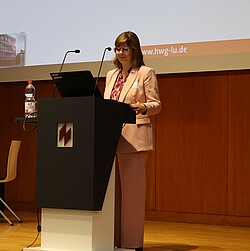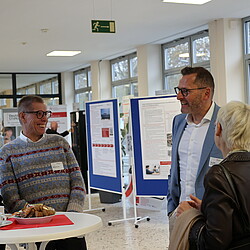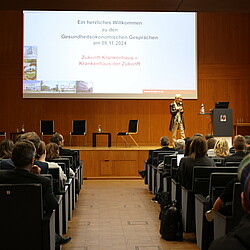Health Economics Talks 2025
on November 14, 2025, approx. 9:00 a.m. at the HWG Ludwigshafen.
Topic: tbd (our promise: relevant as always).
Health Economic Talks 2024: Future Hospital - Hospital of the Future
Health Economics Talks 2024
- November 8, 2024 at the Ludwigshafen University of Business and Society.
- You can find the program here.
- The list of speakers can be found here.
- Slides for the lecture Future of the hospital (Roland Engehausen).
- Slides of the lecture Medical Process Management (PD. Dr. Matthias Janda).
- Slides from the lecture New Work in Hospitals in Times of Change (Prof. Dr. Jutta Rump).
- Slides from the presentation Securing health care in rural areas through innovative care organization (Dr. Ingo Hüttner).
- Press release on the Health Economics Talks.
The challenges facing hospitals are enormous. The aim of the conference was to broaden the view beyond current reform discussions and shed light on strategic fields of action. From the participants' point of view, it was particularly valuable to learn about implementation-oriented concepts for strategically relevant fields of action in addition to well-founded health policy analyses.
The following topics were discussed in detail:
- Strategic orientation: Roland Engehausen, Managing Director of Bayerische Krankenhausgesellschaft e.V., provided valuable orientation on the strategic positioning of hospitals in his introductory presentation.
- Process optimization: Matthias Janda, Head of Medical Process Management at University Medicine Halle, made it clear that clinical process management plays a decisive role in the economic, patient welfare-oriented and employee-focused success of hospitals. This was illustrated using the example of the establishment of interdisciplinary surgical patient management.
- Digital transformation: Anke Diehl, Chief Transformation Officer at Essen University Hospital, outlined the building blocks of the Smart Hospital concept based on the core statements of Essen University Hospital's Smart Hospital Strategy, which focuses on cultural change, innovation and empathetic future medicine. The cooperation with an advisory board on digitalization and AI, which is made up of representatives from the care area, is groundbreaking.
- New Work: Jutta Rump, Director of the Institute for Employment and Employability IBE at the HWG LU, focused on three dimensions of New Work: identification and motivation, skills and qualifications, and health and well-being. She gave many suggestions on how to make progress in these dimensions and made it clear how good the starting position of companies in the healthcare sector is, as working in this industry is inherently meaningful and also offers a high degree of security. As the discussion showed, there is still plenty of room for improvement when it comes to communicating the positive aspects of working in the healthcare sector.
- Securing healthcare in rural areas: Ingo Hüttner, CEO of Alb Fils Klinikum, shared valuable experience from a transformation project to secure healthcare in rural areas. Specifically, he presented the decentralized Helfenstein health center, which is part of the Alb Fils Klinikum. The audience was presented with a concept of how intersectoral healthcare can be created that integrates comprehensive outpatient services, emergency care, short-term care and other services.
At the Degree, the Health Economics Award in the Best Master's Thesis category was presented to Leonie Brenner with the topic "Relevance and potential of patient-relevant structural and procedural improvements in the context of the proof of benefit of digital health applications (DIGA): Results of an online survey among DIGA manufacturers".
Background: Health economic discussions
The guiding principle of the conference series is to provide professional impetus for sustainable, efficient healthcare and to offer an active network for cooperation partners in health economics at Ludwigshafen University of Applied Sciences and beyond. Special emphasis is placed on the involvement of students - the specialists and managers of the future. Following this approach, the Health Economics Talks have been bringing together decision-makers from all areas of healthcare, politics and science at Ludwigshafen University of Applied Sciences and bringing them into contact with students for over 20 years.
The Health Economics Talks are organized by the Institute for Management, Economics and Health Care at Ludwigshafen University of Business and Society. The conference is generously sponsored by the Förderverein Gesundheitsökonomie an der Hochschule Ludwigshafen e.V.. Prof. Dr. Eveline Häusler and Prof. Dr. Elke Raum are the scientific conference chairs.
Wrap-up of the last Health Economics Talks
Review 2023: Green Health - innovation potential and challenges
- October 13, 2023 at the Ludwigshafen University of Business and Society.
- You can find the program here.
- The list of speakers can be found here.
- Slides for the presentation Sustainability management in practice / Sustainability as a driver of innovation in the healthcare system Perspective on care (Christina Loch)
- Slides from the presentation Reducing overuse - on the way to a sustainable healthcare system (Prof. Dr. PH Verena Vogt)
- Slides for the presentation Perspective Health Insurance (Elke Ruppert)
- Slides for the presentation " Hospital perspective" (Dipl. Ing. Burak Isiksal)
With a share of around 5% of national greenhouse gas emissions (see BMG (2022): Joint Declaration Climate Pact Health. Berlin. p. 4.), the healthcare sector has a large ecological footprint. This applies similarly to water consumption, waste and other factors. At the same time, service providers, health insurers and the industrial healthcare sector, as well as public administrations, face major challenges when it comes to tackling the health consequences of climate change. The German Advisory Council on Health and Care therefore considers the effects of climate change to be a key aspect in the future design of a resilient healthcare system (see SVR Health (2023): Resilience in the healthcare system. Report 2023. Berlin. S. 29.). Green health thus addresses both the need to reduce harmful ecological and social consequences in connection with healthcare services - be it in production, transportation, use or disposal - as well as the change in care requirements.
Dr. Michael Eichinger from the University Medical Center Mannheim and Mainz explained the connection between climate protection, climate adaptation and health protection using the example of municipalities in his presentation "Climate change and health: climate protection as health protection". Like Stich, the head of the Health Care Research in Childhood and Adolescence working group at the University of Mainz and the Planetary Health working group at the Mannheim Medical Faculty of Heidelberg University was convinced that the climate crisis was also a health crisis and that it would also lead to a social crisis. The "planetary polytrauma" had progressed far in the years 2015 to 2023 alone and with it the health risk situation. 'Planetary health' must therefore be implemented as a central cross-cutting topic in government structures and transdisciplinary cooperation must be established across sectors. The development, implementation and evaluation of interventions that have a positive impact on the environment and health should be at the forefront. The good news: "There are few conflicts of objectives between the individual departments," Eichinger was convinced.
In the second thematic block, the Health Economics Talks dealt with innovative approaches to sustainability management from professional practice: Burak Isiksal, Head of Infrastructure, Construction and Purchasing at the BG Klinik Ludwigshafen, gave an insight into the perspective of hospitals; Elke Ruppert from Siemens Betriebskrankenkasse gave the perspective of health insurance companies. Thomas Hugendubel from Roche Pharma AG then spoke on the topic of sustainability management from the perspective of the pharmaceutical industry, supplemented by a contribution from Christina Loch, Head of CSR & Sustainability at Caritasverband Speyer, from the perspective of nursing care. Here, as well as in the subsequent panel discussion, it became clear that ambitious sustainability goals can only be achieved if the players along the entire value chain and across professional groups work together. Sustainability therefore has the potential to become a further driver of cross-sector collaboration, it was concluded.
Not least the students were impressed by the practical experience and impulses shared by the speakers. A key finding from the students' perspective was that the topic of sustainability affects all sub-sectors of healthcare in a variety of ways and is already being actively addressed.
Gleanings 2022: BioTech meets Health Economics
BioTech meets health economics
- October 14, 2022, 9:30 a.m. at the School of Business and Society.
- You can find the programhere.
- The speakers of the GÖG 2022 can be found here.
- Slides for the presentation Healthcare Biotech: Value added contribution in Europe, Dr. Zimmermann, WifOR can be found here.
- Slides from the presentation Healthcare Biotech and Venture Capital, Prof.Dr. Jamin, HWG Ludwigshafen can be found here.
"Germany has the opportunity to become a leading international biotechnology location. The first mRNA vaccine from Mainz has given our country global visibility." (1) This is how the ruling traffic light coalition puts it in its coalition agreement.
Against this backdrop, the Health Economic Talks 2022 will examine "red" biotechnology - the term used to describe the application of biotechnological processes in medical care - from a health economic perspective. The mRNA-based vaccine against COVID-19 from BioNTech is certainly the best-known success of these innovative processes. However, the enormous importance of red biotechnology is made clear by another figure: so-called biopharmaceuticals now account for almost half of all newly approved medicines in Germany. (2)
We are delighted that we have been able to attract renowned experts who will be happy to share their knowledge and answer your questions. The conference will open with a look at success factors for the development of biotechnology clusters. Clemens Hoch, Minister of Science and Health Rhineland-Palatinate, will shed light on the promotion of a biotech cluster in Rhineland-Palatinate from a political perspective. In addition, Thomas Runkel, a proven expert on pharmaceuticals and Asia, will ask what insights can be gained from the development of BioTech clusters in Asia and how they can be utilized in Germany. Other key topics include the quantification of the industry'scontribution to value creationin Europe by Dr. Sandra Zimmermann, WifOR Institute, and the special features of investments in BioTech start-ups from an investor's perspective. In his presentation on Healthcare BioTech and venture capital, Prof. Dr. Gösta Jamin, HWG Ludwigshafen, will also examine how more investor funds can be mobilized for this sector based on his extensive consulting experience with start-ups. The conference will be rounded off with a look at the hurdles that the developed therapeutic approaches have to overcome to gain access to the healthcare system: Fabian Berkemeier, IGES will present Innovative Reimbursement Models for High-Cost Therapeutic Approaches and Prof. Dr. Stefan Lhachimi, HS Neubrandenburg will examine Health Technology Assessment strategies in the context of biotechnology.
The Health Economics Talks 2022 bring together experts and decision-makers from medical biotechnology companies, politics, healthcare and science and provide impetus to successfully master the challenges facing this innovative industry in the interests of efficient medical care.
In addition to networking among the specialist audience, the integration of young health economics expertise offers particular added value to the Health Economics Talks. Take the opportunity to get in touch with graduates and students of health economics degree programs at the HWG and attract young professionals to your company or organization.
(1) SPD, Alliance 90/The Greens, FDP (2021): Daring more progress. COALITION AGREEMENT 2021-2025.P. 17.
(2) Vfa - German Association of Research-based Pharmaceutical Companies (2022): Strong biotech sector ensures growth and more employees. As of June 2, 2022. online https://www.vfa-bio.de (accessed 12.06.2022).
Nachlese 2021: Shaping regional innovation spaces for healthcare delivery
- October 29, 2021, 10:00h as an online event
- ZOOM link to the event: https://hwg-lu-de.zoom.us/j/64433059164
- The current program can be found here.
- The speakers of the GÖG 2021 can be found here.
This year's Health Economic Talks focus on the region as a space for shaping healthcare provision. This regional perspective was already suggested by the German Advisory Council on Health in 2009.1 Most recently, Bündnis 90/Die Grünen called for the establishment of "health regions "2 and the metropolitan area Rhine-Neckar GmbH, together with Gesundheitsplattform Rhein-Neckar e.V., launched a "Rhine-Neckar Health Region" strategy project.3
The conference aims to provide food for thought on how the "health region" design space can be filled with innovative healthcare concepts. Two subject areas will be addressed, with specific projects being presented in each:
- Topic area 1: Neighborhood management
- Topic 2: Regional care aspects - shaping innovation spaces.
Nachlese 2020: Adaptive and resilient healthcare 2030 - utopia or reality?
- Link to the playlist on Youtube.
- Learn more about speakers here.
The Corona pandemic is a stress test for our healthcare system and healthcare systems worldwide. The pandemic is challenging systems not only in terms of the scope and quality of care they provide, but also in terms of their adaptive capacity and resilience. This was the thread taken up by the Health Economics Talks - GÖG 2020. Based on the experiences with and in the Corona pandemic, proven experts addressed approaches for the design of adaptive and at the same time resilient healthcare in expert presentations. In addition, students were involved in the development of innovative solutions through a hackathon.
GÖG 2020 was a great success in digital format: for the first time, the symposium was offered completely virtually and in combination with a hackathon. The presentations were recorded and are available for you.
For the first time, graduates of the health economics programs contribute their expertise to the organization of the conference, so that applies: the GÖG 2020 are a format for, with and by young experts in health care!
Nachlese 2019: Reform construction sites of the financing in the health care system - presentation slides of the speakers
Dr. Martin Albrecht
Managing Director and Head of Health Policy, IGES Institute, Berlin
Thomas Czihal
Zi - Central Institute for Statutory Health Insurance Physicians in Germany, Berlin
Jürgen Graf
Head of the Integrated Performance Management Department, AOK Baden-Württemberg
Dr. Wulf-Dietrich Leber
Head of Hospital Department, GKV Spitzenverband, Berlin
Vera Lux
Management consultancy for nursing and health care, Cologne
Jochen Metzner
Head of Health Department, Ministry of Social Affairs, Labor, Health and Demography Rhineland-Palatinate
Prof. Dr. Volker Ulrich
Chair of Economics III - Finance, University of Bayreuth





